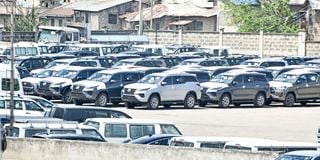Premium
Car prices to fall by at least Sh100k on the strong shilling

What you need to know:
- Second-hand cars are popular among the middle class and small businesses.
- Prices of second-hand cars have been on a steady rise for the past two years.
Prices of imported used cars are projected to drop by at least Sh100,000 from June amid the strengthening of the shilling, a rare relief to buyers who have for months grappled with a spike in the cost of the automobiles.
Dealers say the anticipated price falls, will vary depending on the model of the car.
The price of a Mazda Demio (petrol engine), manufactured in 2017, which is going for an average of Sh1.4 million is expected to drop to ShSh1.3 million. The price of a Toyota Landcruiser V8 is projected to drop to below Sh12 million from the current Sh12.5 million.
The shilling has since February rallied against the dollar to trade at 131 units on Wednesday evening from 144.9 units on February 19, setting the stage for easing in the cost of imports.
The cost of imported second-hand cars surged by up to Sh600,000 between September last year and last month, on the back of the shilling’s woes against the dollar, pushing the units out of the reach of many potential buyers.
“We expect a drop at the earliest in May-June and depending on the car model, we are looking at a minimum of Sh100,000 for the low-end models like the Vitz,” Kenya Auto Bazaar Association secretary-general Charles Munyori told the nation. Other dealers shared similar optimism.
“We expect prices to be favourable in the coming months should the exchange rate maintain the current trend. The effect may be felt in the next few months, maybe one or two months from today,” Antony Aleri, a manager at CarMax East Africa, said.
Second-hand cars are popular among the middle class and small businesses, with Japan being a main source of the units, accounting for 80 percent of the vehicles.
Easing of the car prices will however hit dealers who imported cars when the shilling was at a record low to the dollar.
“Dealers who shipped in cars when the shilling was at 160 units are now staring at huge losses, which we estimate at upwards of Sh1.2 million for some of the units,” Mr Munyori said.
Prices of second-hand cars have been on a steady rise for the past two years on account of supply constraints in source markets and the weakening shilling.
Buyers who have been making orders from last month are set to benefit, marking a rare occurrence where prices of the units will drop on account of a more favourable exchange rate. The dollar is the main currency used in Kenya to pay for imports.
Kenya allows the importation of second-hand cars within the eight-year age limit.
Top government officials have attributed the strengthening of the shilling to a combination of factors including an uptick in investor confidence after the government bought back part of the $2 billion Eurobond.
Another factor is the increased participation of foreigners in the infrastructure bond.





